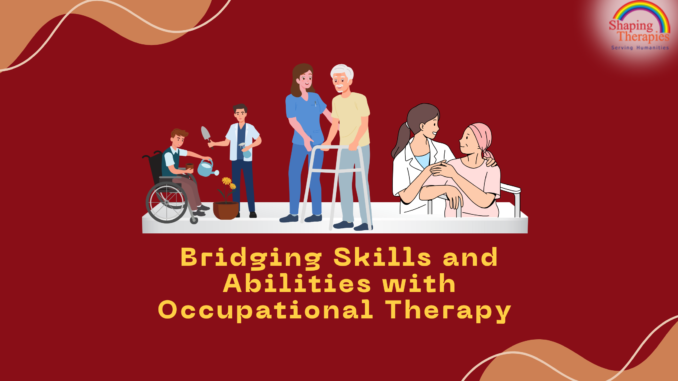
At Shaping Therapies, Thane, we understand the challenges that individuals with physical, sensory, or cognitive difficulties face in daily life. Occupational therapy offers a structured and effective way to help people of all ages bridge the gap between their current abilities and the skills they need to live more independent, fulfilling lives. This blog will explore how Occupational therapy supports individuals in improving key life skills and why it’s such a valuable tool for personal growth.
Whether it’s recovering from an injury, managing a chronic condition, or simply seeking to improve their overall well-being, Occupational therapy can play a crucial role in bridging the gap between skills and abilities.
What Is Occupational Therapy?
Occupational therapy focuses on helping individuals develop, recover, or maintain the skills needed for daily activities, whether at home, work, or school. It is a client-centered practice that tailors therapy to meet the unique needs of each person. Occupational therapists work with people to strengthen their ability to perform tasks and routines that enhance their quality of life.
How Does Occupational Therapy Bridge Skills and Abilities?
There are many ways that Occupational therapy can help individuals bridge the gap between their current abilities and the skills required for daily functioning. Some of the key areas where occupational therapy plays a vital role include:
- Improving flexibility: Occupational therapists use exercises and movement techniques to increase range of motion, making everyday tasks easier to perform.
- Enhancing gross motor skills: By working on balance, coordination, and strength, Occupational therapy helps individuals develop better control over large body movements essential for activities like walking, standing, and lifting.
- Developing self-care habits: Personal care tasks such as dressing, grooming, and feeding are often a focus. Occupational therapists create personalized routines that empower individuals to become more independent in managing their personal care.
- Sensory integration: Many individuals, particularly children with sensory processing disorders, benefit from Occupational therapy that helps them better interpret and respond to sensory input like sounds, touch, and movement.
Key Skills Used by Occupational Therapists
To provide effective therapy, Occupational therapists bring a wide range of skills into their practice. Some of the most important ones include:
- Communication: Occupational therapists need strong communication skills to explain tasks, encourage progress, and coordinate with other healthcare professionals or family members.
- Problem-solving: Finding solutions to unique challenges is at the core of Occupational therapy. Therapists must creatively adapt exercises and activities to suit each individual’s specific needs.
- Empathy: Understanding the emotional and psychological struggles that accompany physical or sensory challenges is key to building trust and encouraging progress in therapy.
How Occupational Therapy Helps Different Groups
Occupational therapy benefits a wide variety of individuals, including:
- Children: For kids, especially those with developmental delays, Occupational therapy can help improve motor skills, social skills, and academic performance. It’s particularly beneficial for children with autism spectrum disorder, cerebral palsy, or sensory processing issues.
- Adults: Adults recovering from injury, surgery, or conditions like stroke often benefit from Occupational therapy to regain mobility and daily function. It also assists individuals with mental health issues, helping them create coping strategies to manage daily life.
- Elderly: Older adults facing age-related issues such as arthritis or declining mobility can greatly improve their quality of life with Occupational therapy. Therapy can help them maintain independence and prevent falls through targeted exercises and home modifications.
Benefits of Occupational Therapy
- Increased independence: Occupational therapy can help individuals become more independent in their daily lives.
- Improved quality of life: By addressing physical, cognitive, and emotional challenges, occupational therapy can significantly improve quality of life.
- Enhanced participation: Occupational therapy can help individuals participate more fully in activities they enjoy.
- Reduced pain and discomfort: For individuals with chronic pain or discomfort, occupational therapy can help manage symptoms and improve overall well-being.
Additional Areas Where Occupational Therapy Excels
In addition to core areas like motor skill development and self-care, occupational therapy can also help with:
- Cognitive skill development: Improving memory, concentration, and problem-solving for individuals with cognitive impairments.
- Fine motor skills: Enhancing hand-eye coordination for tasks like writing, using utensils, or buttoning clothes.
- Home and workplace adaptations: Modifying environments to improve accessibility and functionality, making it easier for individuals to navigate daily tasks in their living and working spaces.
- Vocational training: Helping individuals prepare for the workforce by developing job-specific skills and improving physical or cognitive abilities to match job demands.
The Role of Family Involvement
Family plays a crucial role in the success of Occupational therapy. Therapists often involve family members to ensure that exercises and routines practiced during therapy are continued at home. This involvement fosters faster progress and creates a supportive environment that promotes independence and confidence. At Shaping Therapies, Thane, we emphasize family education and participation to help our clients achieve the best possible outcomes.
Conclusion
Occupational therapy is an invaluable tool that helps individuals of all ages bridge the gap between their current abilities and the skills they need for daily life. Whether it’s improving gross motor skills, developing self-care habits, or integrating sensory processing, the benefits of occupational therapy are profound. At Shaping Therapies, Thane, our team is committed to providing personalized, compassionate care that supports each individual’s unique journey toward greater independence and well-being.
If you or your loved one could benefit from Occupational therapy, reach out to Shaping Therapies, Thane today to learn more about how we can help. Together, we can bridge the skills and abilities needed for a brighter future.
Contact us today to schedule a consultation and learn more about how occupational therapy can benefit you.

Leave a Reply